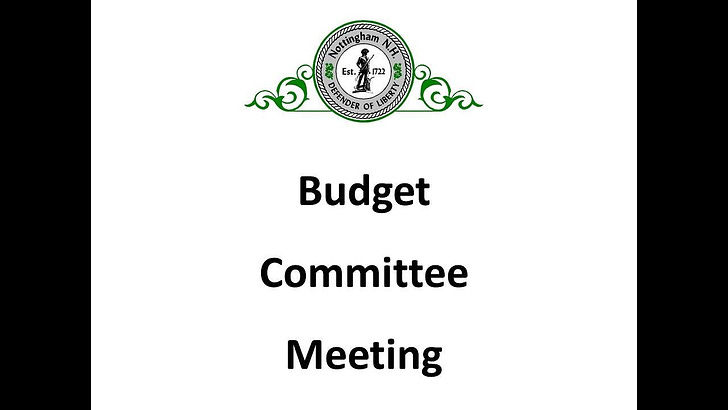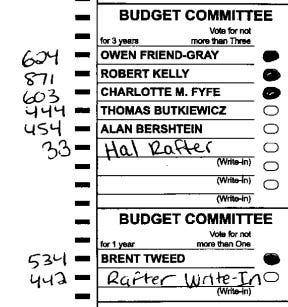For the third time in a year and a half the Budget Committee had to fill a vacancy on the committee due to a resignation. Committee Chairman Michelle King submitted her resignation letter on March 22.
The high level of resignations may be associated with how taxing it is to serve on this committee. During budget season their meetings are frequent and long. The committee is ideologically divided. Their meetings are prone to becoming heated and unruly. The citizens of Nottingham should be thankful to anyone who volunteers for this thankless, tedious, stressful, and unpaid role.
The meeting began with a discussion of whether the committee should officially post the opening on the town website and do other things to attract candidates. As the committee already had four volunteers for the position, it was decided that this was unnecessary.
Three of the volunteers were losing candidates from the last election and were present in the room: Tom Butkiewicz, Alan Bershtein, and Hal Rafter. One volunteer had not run last year and had volunteered via an email: Sandra Vilchock. There was a discussion about whether Vilchock, who is currently on paid administrative leave from Fire & Rescue, was allowed on town property. Selectman Welch said she was only barred from the fire station.
Michael Kelly said that he thought that the Board of Selectmen had set a good precedent a few weeks ago by filling their vacancy with the defeated candidate from the most recent election who got the most votes. He noted that this was Alan Bershtein and moved to appoint Bershtein to the position.
A discussion ensued about whether this was the best way to select candidates. It was decided that the committee should hear from the candidates and ask them questions. Readers who are particularly interested in the details of the ideological divisions on the committee should watch the video beginning at 13:48. In brief, Bershtein said he would serve if elected; however, he recommended that the committee chose Butkiewicz instead. Rafter was aggressively questioned associated with his opposition to the 4% tax cap and his record as a former Selectman and School Board member with regard to spending. Butkiewicz touted his past performance on the committee with respect to identifying items to cut from the budget.
After this, it was decided that there should be a vote in which each member of the committee named who they wanted to fill the position. The count was 6 Butkiewicz to 4 Rafter.
The committee selected Michael Kelly as Chairman and Owen Friend-Gray as Vice Chairman.
Commentary
This idea that the Board of Selectmen and the Budget Committee should fill vacant positions based on which losing candidate got the most votes in the last election should not be considered a precedent. Such a method does not represent the will of the voters. Worse, claiming that this is the legitimate way to pick candidates causes unnecessary voter dissatisfaction with the process of appointing people to fill vacancies. Nottingham’s voters have more than enough real things to be dissatisfied about. They don’t need fake ones.
While nominally Budget Committee and Board of Selectmen positions are non-partisan, in practice these are partisan positions, with the town’s Republicans and Democrats endorsing candidates and funding advertising for them. If one party’s slate of candidates all win, that indicates voters preferred that party’s position. In such a case the voters would probably prefer a candidate who did not run in the prior election but was endorsed by the winning party over a losing candidate from the losing party.
Further complicating matters is that often there are two or even three simultaneous elections to the same office, but for different term lengths. In the most recent Budget Committee election Rafter did not run against Butkiewicz and Bershtein. Because they did not run against each other, the number of votes each of them got says little about voters’ preferences between Butkiewicz and Rafter.
More than anything else, what the vote tally shows is the number of votes for blue no matter who versus the number of votes for red even if they’re dead. The bottom line is that the voters strongly preferred candidates other than the ones who lost.
The same thing happened the last time the Budget Committee voted to fill a vacancy. Vote totals for candidates who lost for the 2-year position were compared with those who lost for the 3-year position. The committee chose the candidate who got the fewest votes.
The recent vacancy on the Board of Selectmen also presented another kind of non-comparable comparison. How can it be said that a losing candidate from the most recent election was really the voters’ preference over a former Selectman the voters had chosen multiple times? The Selectmen had available to them many good reasons for choosing one candidate over the other, but who lost less badly in the last election was not a good reason. It was just rhetoric.
It’s also fascinating to consider that Michael Kelly’s claim that Alan Bershtein got the highest number of votes was factually incorrect. Hal Rafter got a total of 475 votes. Bershtein got 454. It’s too bad someone at the meeting did not point this out after Michael Kelly made his motion. What would have happened?
Of course, politicians may engage in any rhetoric they think is persuasive. Voters would be wise, however, to disapprove of this tactic.
While the rhetoric was used in an attempt to persuade other members of the Budget Committee, it likely had no effect. The committee has few swing voters and even those have observable leans. The committee’s members voted to fill the vacancy on party lines. There was probably little that anyone could say or do that would have changed the outcome. Last year the committee filled a vacant position with the losing candidate with the lowest number of votes. This year it did the same thing.
Grab some popcorn and watch the video for some Nottingham political drama:




